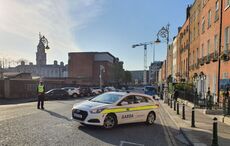Reverend David Boase has been the priest at two Episcopal churches in Illinois for the past 14 years but now faces deportation for illegally voting in 2006.
After easily being able to register to vote in Illinois after just two years in the country, Reverend David Boase was not aware that he was breaking a federal law in 2006 when he cast a vote for a ballot measure to boost fire-protection resources for the local fire department.
Having used his two British forms of ID to register after passing his driving test the year before, he was unaware that the presence on the ballot of a single federal Democratic candidate running unopposed for the House of Representatives would bring his time in the US to an end.
“I never voted again,” Rev. Boase told the Washington Post after a friend told him that what he had done was a federal offense.
Boase now faces deportation, however, after revealing the vote during his citizenship interview last year. Having spent 14 years as the priest at two Episcopal churches in Alton, a southern Illinois river town, the 69-year-old is now expected to have to return to England, the homeland he said goodbye to over a decade ago.
Read more: A kinder, gentler resistance is needed when dealing with modern US immigration issues
Boase states that as soon as he arrived in the town he knew that it was where he wished to stay.
“It was a heartfelt sense of belonging, and that was a large part of the impetus of my seeking citizenship,” he told the Post.
“I just wanted to belong in the fullest possible way here in America, as a responsible citizen.”
It’s now almost certain that he will have to bid farewell to Illinois, however, as his admission during last year’s citizenship interview with U.S. Citizenship and Immigration Services resulted in a notice to appear in immigration court — the charging document that initiates removal proceedings.
“It’s a shame when a person tells the truth and admits fault, intends to explain in all honesty, with full disclosure, and still everything falls apart,” Boase said.
“All I want to do is continue to live here. I still want to be an American citizen, but I can’t see that ever happening.”
Despite his parishioners starting up a GoFundMe for his legal fees and even contacting their Senator Tammy Duckworth, recent changes to USCIS policy are believed to be the reason behind his notice to appear in court. Before the changes made this summer, Rev. Boase may not have been given the same attention as his case is now getting.
Read more: Irish-born flee Trump’s America new figures show
What are you doing to help the of Alton, Illinois keep their beloved Rev. David Boase from being deported? @SenDuckworth
— trim (@trym3193) September 24, 2018
The changes were made to fall in line with President Trump’s executive order of January 2017 which broadened the classes of immigrants that USCIS would be not only encouraged but required to deport.
USCIS stated that they could not comment on whether Boase's had been affected by the changes to policy made in June.
“Protecting the integrity of our laws is a top priority of USCIS,” spokesman Michael Bars said in a statement.
“The agency is committed to adjudicating all petitions and applications fairly, efficiently, and effectively on a case-by-case basis to determine if they meet all standards required under applicable law, policies, and regulations.”
The priest’s immigration attorney David Cox believes it is a direct result of this more hard-line approach, however.
“If I had to guess why they didn’t overlook this [in Boase’s] case, which they have the full discretion to do,” Cox said to the Post.
“I can only think that the reason his case got this treatment is because they took this harsh approach.”
With his attorney now asking the court to allow Boase to leave the country voluntarily rather than be deported, the priest continues to say Mass in Illinois while coming to terms with the massive move he now must make.
“I feel, oddly enough, a calmness about everything,” he added.
Do you think Rev. Boase should be deported? Let us know your thoughts in the comments section below.




Comments